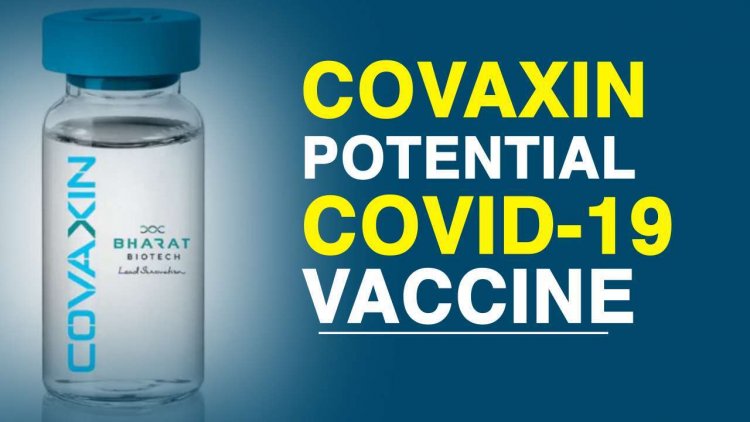COVAXIN - India’s First Indigenous Coronavirus Vaccine, Now Under Human Trials

India's first coronavirus vaccine ‘COVAXIN’ is developed by Hyderabad-based Bharat Biotech. With the 'Make in India' and becoming 'self-reliant' gaining momentum during the pandemic, India launched the first trials of this home-grown vaccine.
Here’s what all you need to know about the potential coronavirus cure:
It is India's first indigenous inactivated vaccine for the current, highly infectious coronavirus.
The Company Bharat Biotech- started operations in 1996- the year Dr. Krishna M. Ella and Mrs. Suchitra Ella returned from the US to set up a company dedicated to creating innovative vaccines and bio-therapeutics. Dr. Ella was returning from a research and teaching stint in the US and he wanted the new company to be an intellectual capital powerhouse. In the years that followed, he assembled a team of bright scientists and led the creation of path-breaking vaccines.
The company on its website said it is pleased to announce its 3 COVID-19 vaccines in collaboration with the University of WISCONSIN, ICMR and Thomas Jefferson University.
The vaccine strain was first isolated from the National Institute of Virology, Pune. It was later handed over the pharma giant, Bharat Biotech, to be developed into a vaccine.
In June, it was reported that the development of the vaccine was going well, as expected, and the whole month was crucial for vaccine development at Bharat Biotech. Bharat Biotech has immense knowledge in inactivated vaccines for rabies, polio, rotavirus, Japanese Encephalitis, Chikungunya, Zika, and now for SARS-CoV-2.
It was in the last week of June that Covaxin, ICMR and Bharat Biotech's home-grown vaccine received approval from the Drug Controller General of India to conduct human trials of the vaccine.
In the second week of July, the clinical human trials of Covaxin began in the country. AIIMS Patna, PGI Rohtak, AIIMS Delhi, NIMS Hyderabad are some of the institutes where the trials have already begun, and results are being looked forward to. Dr Randeep Guleria said that human trial of India’s first indigenously developed coronavirus vaccine has begun at the All India Institute Of Medical Sciences, New Delhi.
In an official statement in the first week of July, ICMR Director General Balram Bhargava stated that ICMR aims to launch the indigenous COVID-19 vaccine by August 15. However, the final outcome will depend on the cooperation of all clinical trial sites involved in this project. The ICMR had selected 12 institutes, including one from Odisha, for the clinical trial of the country's first indigenous COVID-19 vaccine.
The robust indigenous IgG ELISA test for antibody detection developed by ICMR-NIV, Pune played a critical role in surveillance of proportion of the population exposed to SARS-CoV-2 coronavirus infection.
Since the ELISA test was based on detection of antibodies, it could only help in knowing if the person has been previously infected by coronavirus. Since it detects antibodies, even people who have remained symptom-free (asymptomatic) during the entire course of the infection will test positive. However, according to the Centres for Disease Control and Prevention (CDC), it takes one-three weeks for the antibodies to develop in response to infection. So, if a person who has been recently infected by the virus is tested during the window period (the time taken to develop antibodies) the result will turn out to be negative. But a repeat test after a couple of weeks will indicate the true infection status.
While the RT-PCR, which detects the RNA of the coronavirus, enables detection of current infection, it will not be useful if the testing is carried out days after the infection clears as the virus will no longer be present. The SARSCoV2 strain was isolated in NIV, Pune & transferred to Bharat Biotech.
Earlier, Bharat Biotech's Chairman and Managing Director, Dr Krishna Ella says "We are proud to announce COVAXIN, India's first indigenous vaccine against COVID-19. The collaboration with ICMR and NIV was instrumental in the development of this vaccine.
He added, "Our R&D and Manufacturing teams worked tirelessly to deploy our proprietary technologies towards this platform," he said. Expedited through the national regulatory protocols, the company accelerated its objective in completing the comprehensive pre-clinical studies.
At present, the human clinical trials of the indigenously developed Covid-19 vaccine candidate Covaxin, kicked off at the AIIMS, Delhi on Friday.
A 30-year-old man was given the first shot of vaccine of Covaxin, India’s first Covid-19 vaccine.
The volunteer will be kept in observation for two hours in the hospital. He will then be sent home and be monitored for the next seven days, sources in the AIIMS said.
This is the first dose of the ‘Covaxin’ vaccine that has been administered to the 30-year-old healthy male who qualified after initial screening and tests that were conducted on several volunteers for the vaccine human trials.
In phase I, the vaccine would be tested on 375 volunteers and 100 of them, the highest, would be from AIIMS. The second phase, would include around 750 volunteers from all 12 sites.
Phase I of the trial will be done on healthy people, aged between 18 and 55 years, having no co-morbid conditions. Women with no pregnancy will also be selected for the trial in the first phase.
In the phase II, 750 people will be recruited and they will be between 12 and 65 years of age.
AIIMS-Delhi is among the 12 sites selected by the Indian Council for Medical Research for Phase I and II randomised, double-blind and placebo-controlled clinical trials of Covaxin.















































